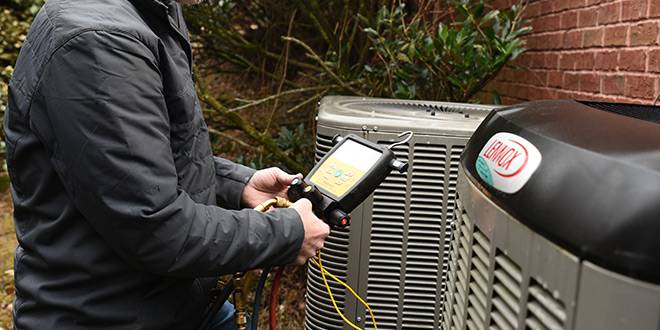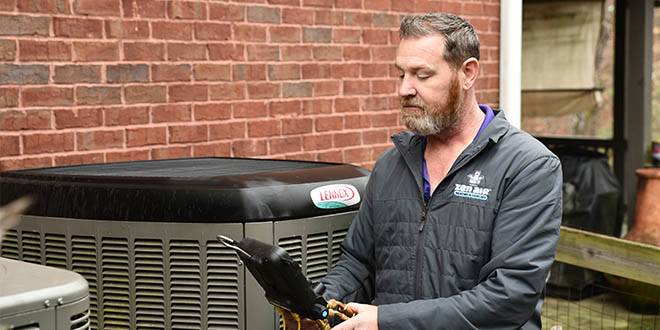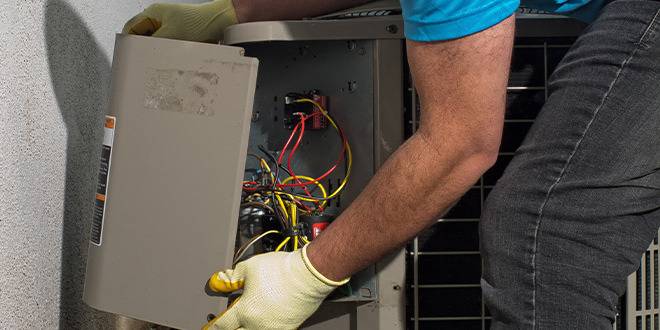
Keeping your home cool and comfortable during the hot summer months is crucial, and a well-functioning air conditioning (AC) system plays a vital role in this. Central to your AC’s performance is the refrigerant, the substance that absorbs heat from your home and releases it outside. However, when a refrigerant leak occurs, it can lead to a host of problems, including reduced cooling efficiency, higher energy bills, and potential damage to your AC system.
In this guide, we’ll explore the importance of AC refrigerant, how to detect leaks, and what steps to take if you suspect a leak. We’ll also provide tips on preventing leaks and explain why Zen Air Heating & Cooling is your best choice for refrigerant leak detection and repair.
What is AC Refrigerant, and Why is it Important?
AC refrigerant is a crucial component of your air conditioning system, responsible for absorbing heat from your home and releasing it outside. This heat exchange process is what keeps your living space cool and comfortable. Without the right amount of refrigerant, your AC system cannot effectively remove heat, leading to poor performance and discomfort.
Importance of Maintaining Proper Refrigerant Levels
- Optimal Cooling Performance: Adequate refrigerant levels ensure your AC system operates efficiently, providing consistent and effective cooling.
- Energy Efficiency: Proper refrigerant levels help maintain energy efficiency, keeping your utility bills in check.
- System Longevity: Maintaining the correct refrigerant levels can prevent unnecessary strain on your AC system, reducing the risk of breakdowns and extending its lifespan.
Understanding the role of refrigerant in your AC system underscores the importance of detecting and addressing leaks promptly. In the next section, we’ll discuss the common signs of a refrigerant leak so you can identify issues early.
Signs of a Refrigerant Leak
Detecting a refrigerant leak early can save you from costly repairs and ensure your AC system continues to run efficiently. Here are some common indicators of a refrigerant leak:
- Reduced Cooling Efficiency: If your AC isn’t cooling your home as effectively as it used to, despite the thermostat settings, a refrigerant leak might be to blame.
- Longer Cooling Cycles: An AC system low on refrigerant will struggle to maintain the desired temperature, causing it to run longer and more frequently.
- Higher Energy Bills: Unexplained increases in your energy bills could indicate your AC is working harder to cool your home due to a refrigerant leak.
- Hissing or Bubbling Noises: Unusual sounds like hissing or bubbling can signal a refrigerant leak, as the escaping refrigerant makes noise.
- Ice Buildup on Evaporator Coils: Refrigerant leaks can cause the evaporator coils to freeze, resulting in ice buildup and reduced cooling capacity.
- Warm Air from Vents: If your AC is blowing warm or lukewarm air instead of cool air, a refrigerant leak might be the culprit.
Recognizing these signs early can help you address refrigerant leaks before they cause significant damage to your AC system. In the following section, we’ll explore the common causes of refrigerant leaks and how to prevent them.

Causes of Refrigerant Leaks
Understanding the common causes of refrigerant leaks can help you take preventive measures and maintain your AC system’s efficiency. Here are some typical reasons why refrigerant leaks occur:
- Corrosion of Copper Tubing: Over time, the copper tubing in your AC system can corrode, leading to small holes and leaks. This is often due to exposure to formaldehyde, which can form formic acid, eating away at the copper.
- Wear and Tear: Normal wear and tear on your AC system can cause joints and connections to weaken and eventually leak. Vibrations and temperature fluctuations can exacerbate this wear and tear.
- Poor Installation: If your AC system was not installed correctly, it might have weak points that are prone to leaks. This can include improper fittings or insufficient sealing of joints.
- Factory Defects: Although rare, some AC systems may have manufacturing defects that lead to refrigerant leaks. These defects might not become apparent until after some use.
- Physical Damage: External factors such as physical damage from lawn equipment, pets, or debris can puncture the refrigerant lines, causing leaks.
Mitigating Risk Factors
- Regular Maintenance: Scheduling regular maintenance can help identify potential problems before they lead to leaks. Consider joining Zen Air’s Club Zen Maintenance Membership for annual inspections and priority service.
- Proper Installation: Ensure your AC system is installed by experienced professionals. Zen Air’s AC installation services guarantee proper setup to prevent future leaks.
In the next section, we’ll discuss various methods for detecting refrigerant leaks, both professional and DIY.
Methods for Detecting Refrigerant Leaks
Detecting refrigerant leaks promptly is crucial for maintaining your AC system’s efficiency and longevity. Here are some methods for detecting refrigerant leaks, including both professional techniques and DIY tips:
Professional Detection Methods
- Electronic Leak Detectors: HVAC technicians use electronic leak detectors to sense the presence of refrigerant in the air. These devices are highly sensitive and can pinpoint even the smallest leaks.
- Ultraviolet (UV) Dye: Technicians can add a UV dye to the refrigerant, which circulates through the system. Using a UV light, they can then identify the exact location of the leak, as the dye will glow under the light where the leak is present.
- Nitrogen Pressure Test: This involves evacuating the refrigerant and filling the system with nitrogen, which is harmless and inert. Technicians then use a pressure gauge to check for drops in pressure, indicating a leak.
- Soap Bubble Solution: This old-school method involves applying a soap solution to suspected areas. If there’s a leak, bubbles will form at the leak site. While simple, it’s often used in conjunction with other methods for confirmation.
DIY Detection Tips
- Visual Inspection: Look for oil stains or residues around the refrigerant lines, connections, and coils. Refrigerant leaks often leave an oily residue.
- Listen for Unusual Noises: As mentioned earlier, hissing or bubbling sounds can indicate a refrigerant leak. Pay close attention to any unusual noises coming from your AC system.
- Monitor Cooling Performance: If you notice a decline in your AC’s cooling performance, it might be time to investigate further or call a professional.
Tools for DIY Detection
- Refrigerant Leak Detectors: Affordable handheld refrigerant leak detectors are available for homeowners who want to attempt detection themselves.
- UV Dye Kits: DIY UV dye kits can help you identify leaks using the same principle as professional UV dye detection.
While DIY methods can provide some insights, professional detection is often more accurate and reliable. If you suspect a refrigerant leak, it’s best to contact professionals like Zen Air for thorough detection and repair services. Our AC repair services ensure that your system is restored to optimal performance.
Next, we’ll explore the impact of refrigerant leaks on your AC system.
The Impact of Refrigerant Leaks on Your AC System
Refrigerant leaks can have several negative effects on your AC system, impacting both its efficiency and longevity. Here’s a closer look at how refrigerant leaks can affect your air conditioning system:
- Reduced Cooling Efficiency: With insufficient refrigerant, your AC system will struggle to absorb and remove heat effectively. This leads to reduced cooling capacity, making it harder to maintain a comfortable indoor temperature.
- Higher Energy Bills: As your AC works harder to cool your home due to low refrigerant levels, it consumes more energy. This results in higher electricity bills, as the system runs longer and more frequently.
- Increased Wear and Tear: Operating with low refrigerant puts extra strain on your AC components, such as the compressor. This increased stress can lead to premature wear and potential breakdowns, necessitating costly repairs or replacements.
- Frozen Evaporator Coils: Low refrigerant levels can cause the evaporator coils to freeze, forming ice and further hampering the cooling process. This can lead to additional issues, such as water damage when the ice melts.
- Environmental Impact: Refrigerant leaks can release harmful chemicals into the environment, contributing to ozone depletion and global warming. Addressing leaks promptly is essential for minimizing environmental damage.
- Poor Air Quality: Leaking refrigerant can sometimes mix with indoor air, potentially leading to health issues such as headaches, nausea, and respiratory problems for the occupants.
Addressing refrigerant leaks promptly is crucial to prevent these negative impacts. If you suspect a leak, it’s essential to take action immediately. In the next section, we’ll outline the steps you should take if you suspect a refrigerant leak in your AC system.

Steps to Take if You Suspect a Leak
If you suspect a refrigerant leak in your AC system, taking immediate action can help prevent further damage and ensure your system continues to operate efficiently. Here are the steps you should follow:
- Turn Off Your AC: If you notice signs of a refrigerant leak, such as reduced cooling efficiency or unusual noises, turn off your AC system to prevent further damage.
- Inspect for Visible Signs: Perform a visual inspection of your AC unit, looking for oily residues, ice buildup on the evaporator coils, or any obvious signs of damage to the refrigerant lines.
- Listen for Unusual Noises: Pay attention to any hissing or bubbling sounds that could indicate a refrigerant leak.
- Check for Reduced Cooling Performance: Note any changes in your AC system’s cooling performance, such as longer cooling cycles or warm air blowing from the vents.
- Contact a Professional: While DIY methods can provide some insights, professional detection and repair are more accurate and reliable. Contact Zen Air Heating & Cooling for expert diagnosis and repair. Our experienced technicians can quickly identify and fix refrigerant leaks, ensuring your AC system runs smoothly. Visit our contact page to schedule a service.
- Schedule Regular Maintenance: Regular maintenance can help prevent refrigerant leaks and other issues. Consider joining Zen Air’s Club Zen Maintenance Membership for annual inspections, discounted services, and priority scheduling.
By following these steps, you can address refrigerant leaks promptly and maintain the efficiency of your AC system. In the next section, we’ll discuss preventative measures to avoid refrigerant leaks in the future.
Preventing Refrigerant Leaks
Preventing refrigerant leaks is essential for maintaining the efficiency and longevity of your AC system. Here are some proactive steps you can take to minimize the risk of leaks:
- Regular Maintenance: Scheduling regular maintenance is the most effective way to prevent refrigerant leaks. Professional technicians can identify potential issues early and address them before they become significant problems. Consider Zen Air’s Club Zen Maintenance Membership, which offers annual inspections, discounted services, and priority scheduling.
- Proper Installation: Ensure your AC system is installed by experienced professionals. Proper installation minimizes the risk of weak points and potential leaks. Zen Air’s AC installation services guarantee correct setup and optimal performance.
- Prompt Repairs: Address any AC issues immediately. Small problems, if left untreated, can lead to larger issues, including refrigerant leaks. Zen Air provides reliable AC repair services to keep your system in top condition.
- Use High-Quality Components: Using high-quality components during repairs and installations can reduce the risk of leaks. Quality parts are more durable and less prone to wear and tear.
- Monitor System Performance: Keep an eye on your AC system’s performance. Any changes in cooling efficiency, unusual noises, or increased energy bills should prompt a professional inspection.
- Protect Your Outdoor Unit: Ensure your outdoor AC unit is protected from physical damage caused by lawn equipment, pets, or debris. Consider installing a protective cover or barrier.
- Avoid Overloading the System: Ensure your AC system is appropriately sized for your home. An overworked system is more prone to leaks and other issues. Zen Air can help you choose the right system for your needs.
Implementing these preventative measures can help you avoid the inconvenience and expense of refrigerant leaks. In the next section, we’ll explain why Zen Air Heating & Cooling is your best choice for refrigerant leak detection and repair.
Why Choose Zen Air for Refrigerant Leak Detection?
When it comes to refrigerant leak detection and repair, Zen Air Heating & Cooling stands out for several reasons. Here’s why you should trust us with your AC system:
- Expertise and Experience: Our team of highly skilled technicians has years of experience in diagnosing and repairing refrigerant leaks. We stay up-to-date with the latest technologies and best practices to ensure top-notch service.
- Comprehensive Services: We offer a full range of services, including AC repair, installation, and maintenance. Whether you need a quick fix or a complete system overhaul, we have you covered.
- Customer Satisfaction: At Zen Air, customer satisfaction is our top priority. We pride ourselves on delivering exceptional service and exceeding customer expectations. Our positive reviews and repeat customers are a testament to our commitment to quality.
- Advanced Detection Methods: We use state-of-the-art equipment and techniques for refrigerant leak detection, ensuring accurate and efficient identification of leaks. Our methods include electronic leak detectors, UV dye, nitrogen pressure tests, and more.
- Preventative Maintenance Plans: Our Club Zen Maintenance Membership offers regular inspections, priority scheduling, and discounts on services. Regular maintenance helps prevent leaks and keeps your system running efficiently.
- Financing Options: We understand that AC repairs and installations can be a significant investment. That’s why we offer flexible financing options to make our services more accessible and affordable.
- Family-Owned and Operated: As a family-owned business, we bring a personal touch to our services. We treat every customer like family and strive to build lasting relationships based on trust and reliability.
Choosing Zen Air means choosing quality, reliability, and peace of mind. Contact us today via our contact page to schedule a service and experience the Zen Air difference.

Conclusion
Detecting and addressing refrigerant leaks promptly is crucial for maintaining the efficiency and longevity of your AC system. Leaks can lead to reduced cooling performance, higher energy bills, increased wear and tear, and potential environmental harm. By recognizing the signs of a refrigerant leak and understanding the common causes, you can take proactive steps to prevent and address leaks effectively.
If you suspect a refrigerant leak, it’s essential to act quickly. Turn off your AC, perform a visual inspection, and contact a professional like Zen Air Heating & Cooling. Our experienced technicians can accurately detect and repair leaks, ensuring your AC system runs smoothly and efficiently.
Preventative maintenance is key to avoiding refrigerant leaks. Regular inspections, proper installation, and prompt repairs can keep your system in top condition. Consider joining Zen Air’s Club Zen Maintenance Membership for annual inspections, discounted services, and priority scheduling.
When it comes to refrigerant leak detection and repair, Zen Air Heating & Cooling is your trusted partner. Our expertise, comprehensive services and commitment to customer satisfaction make us the best choice for all your AC needs. Contact us today through our contact page to schedule a service and ensure your home stays cool and comfortable.
Thank you for choosing Zen Air Heating & Cooling – The Art of Comfort.



